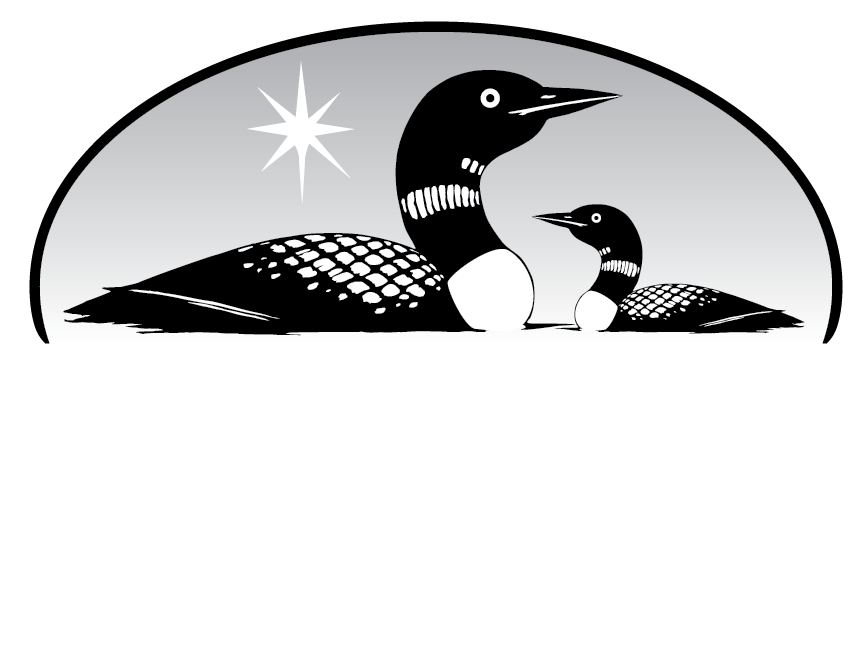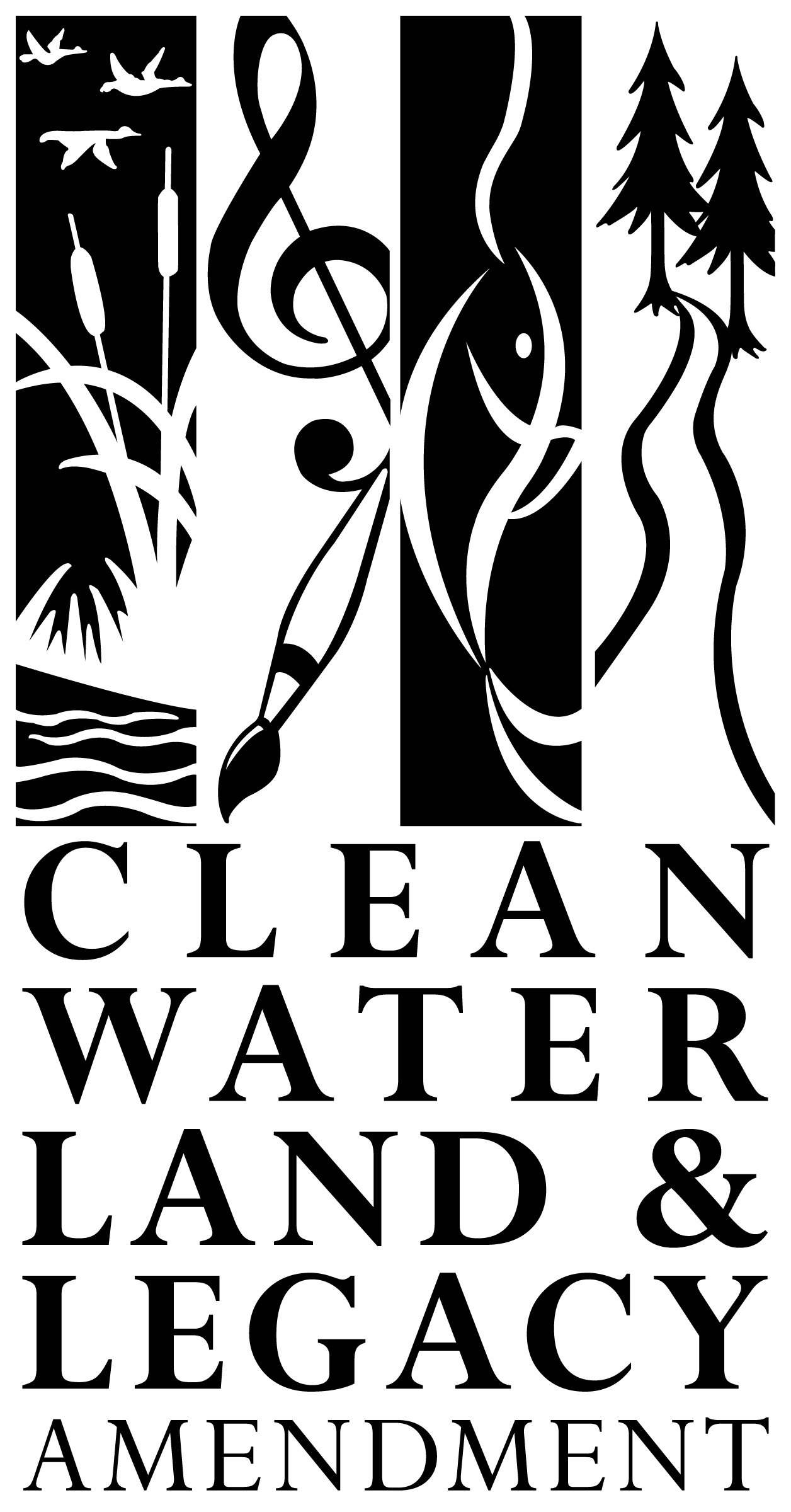The Minnesota Land Trust has protected beautiful, undeveloped Pancake Lake in Cass County, MN, and a portion of Boy River, which connects seven deep, tullibee-supporting cold water lakes in the Mississippi Headwaters region of Minnesota.
Pancake Lake is surrounded by 222 acres of undeveloped hardwood forest and wetlands, including forested peatlands, bog, and wet meadows, which help preserve the water quality and aquatic habitat of Pancake Lake. The property is estimated to sequester about 39 metric tons of carbon per year, the equivalent of 30 gasoline-powered passenger vehicles driven for one year!
According to Minnesota Land Trust Conservation Program Manager Ruurd Schoolderman, “In our line of work, it’s relatively rare to be able to permanently protect an entire lake. So we were really excited and fortunate to have the opportunity to do that here. Because of the landowners’ commitment to conservation, this habitat complex will be able to support wildlife and recreation for future generations even in the face of climate change.”
Protecting Tullibee Lakes & Minnesota’s Large Gamefish
Tullibee, sometimes referred to as “cisco” or “chub,” is a native species of cold-water whitefish found in deep, cold, oxygen-rich lakes in northern Minnesota. Tullibee is an important nutrient-rich food source for large gamefish like walleye, northern pike, muskellunge and lake trout.
Threats to tullibee include warming waters due to climate change and deforestation, and “eutrophication” from shoreline development and land use conversion in the lake’s watershed.
Eutrophication occurs when increased nitrogen and phosphorus levels from agriculture promote algae growth in lakes. When algae eventually die and decompose on the lake bottom it depletes oxygen levels there. Tullibee requires both oxygen and the cold-water refuge of the lake bottom in order to survive.
Private forest landowners play a crucial role in the protection of Minnesota’s tullibee and large gamefish in a region of Minnesota experiencing rapid commercial and private development. Tullibee have been documented in seven lakes in the region where the protected property is located, including Birch Lake, Pleasant Lake, Big Deep Lake, Woman Lake, Inguadona Lake, Boy Lake, and Leech Lake.
- Minnesota has around 650 tullibee lakes, more than any other state in the lower 48.
- A study conducted by the Minnesota Department of Natural Resources and University of Minnesota found that only about 27% of Minnesota’s tullibee lakes (176) are predicted to be able to sustain the species even after further climate warming occurs in Minnesota.
- It’s estimated that tullibee numbers have declined about 60% over the last 30 years.
- Shoreline development, deforestation, excess nutrients, and climate change threaten tullibee habitat.
- Because water from miles around a lake impacts its health, protecting the land in the watershed and not just along the shoreline is critical. In fact, preserving 75% of a lake’s watershed reduces the threat to tullibee.
- They are relatively sensitive to changes in water temperature and oxygen levels and serve as an indicator species for overall water quality and lake health.
- With 5,400 fishable lakes and over 18,000 miles of fishable rivers and streams, Minnesota is one of the nation’s top fishing destinations—1.4 million people purchase a Minnesota fishing license each year, supporting 28,000 jobs and generating $4.4 billion annually.
- Walleye is the top fish sought by anglers, followed by northern pike and muskie combined, all of which feed on tullibee.
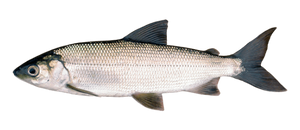
Prioritizing Resilient Lands in the Face of Climate Change
The Nature Conservancy’s Resilient Land Mapping tool rates the protected property with an “above average” resilience score. Compared to other sites in the region, it has a relatively high capacity to maintain species diversity and environmental services as the climate changes. The property is able to support several Species in Greatest Conservation Need (SGCN) including the red-shouldered hawk, purple martin, and northern long-eared bat.
Protected Property Land Resilience Score

Protected Property Photo Gallery
Click or tap on the photos to view full sized images of this beautiful protected property and related wildlife and habitats.



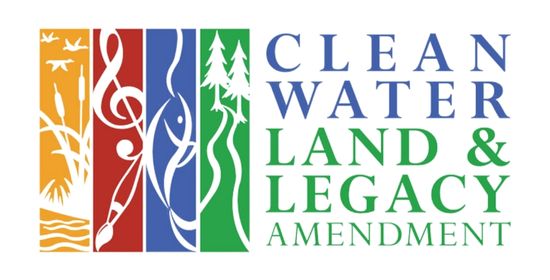
Funding for the acquisition of this easement was provided by Minnesota’s Outdoor Heritage Fund as recommended by the Lessard-Sams Outdoor Heritage Council (LSOHC). Specifically, the Easement was funded through the Fisheries Habitat Protection on Strategic North Central Minnesota Lakes – Phase VI program.

Help Us Protect More of Minnesota’s Mississippi Headwaters Region
Your gift helps us reach more landowners and supports critical conservation work like the protection of Pancake Lake.
Article Contributors
Written by: Sarah Sullivan–Communications & Marketing Manager
Professional review by: Ruurd Schoolderman–Conservation Program Manager
As Seen in the 2023 Spring Review
This property was featured in the Minnesota Land Trust’s 2023 Spring Review publication, focusing on the importance of protecting Minnesota’s clean and fresh water.
Signup to receive these beautiful publications directly to your mailbox.
Thank you for your continued support of habitat conservation, restoration, and nature engagement in Minnesota.
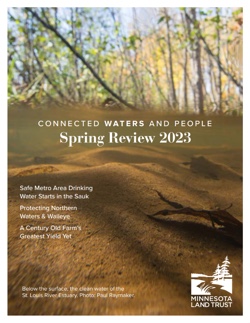
More from the Mississippi Headwaters
- Partnership Protects Bad Axe Lake, Northern Minnesota Fisheries
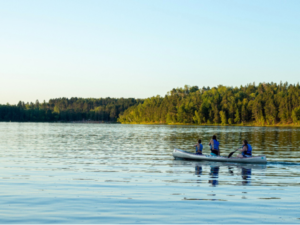 SAINT PAUL, Minn, April 26, 2023 — Together, the Minnesota Land Trust and the Northern Lights Council of the Boy Scouts of America have permanently protected a portion of Boy Scout Camp Wilderness, including over 3,600 feet of natural shoreline on Bad Axe Lake and 219 acres of land and water near Park Rapids, Minnesota. … Read more: Partnership Protects Bad Axe Lake, Northern Minnesota Fisheries
SAINT PAUL, Minn, April 26, 2023 — Together, the Minnesota Land Trust and the Northern Lights Council of the Boy Scouts of America have permanently protected a portion of Boy Scout Camp Wilderness, including over 3,600 feet of natural shoreline on Bad Axe Lake and 219 acres of land and water near Park Rapids, Minnesota. … Read more: Partnership Protects Bad Axe Lake, Northern Minnesota Fisheries - Protecting Pancake Lake in the Mississippi Headwaters
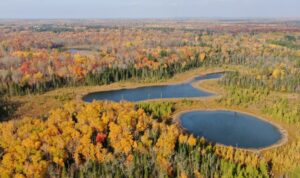 The Minnesota Land Trust has protected beautiful, undeveloped Pancake Lake in Cass County, MN, and a portion of Boy River, which connects seven deep, tullibee-supporting cold water lakes in the Mississippi Headwaters region of Minnesota. Pancake Lake is surrounded by 222 acres of undeveloped hardwood forest and wetlands, including forested peatlands, bog, and wet meadows,… Read more: Protecting Pancake Lake in the Mississippi Headwaters
The Minnesota Land Trust has protected beautiful, undeveloped Pancake Lake in Cass County, MN, and a portion of Boy River, which connects seven deep, tullibee-supporting cold water lakes in the Mississippi Headwaters region of Minnesota. Pancake Lake is surrounded by 222 acres of undeveloped hardwood forest and wetlands, including forested peatlands, bog, and wet meadows,… Read more: Protecting Pancake Lake in the Mississippi Headwaters - Protecting the Outdoors for Future Generations—YMCA Camp Olson
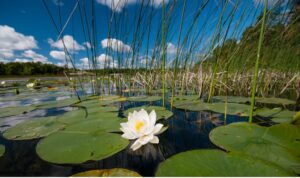 When E.O. Olson donated the land near Longville that would become YMCA Camp Olson in 1954, he inscribed these words on the dedication plaque: “One man may not live to see his dreams come true, but his institutions carry on. We hope the Young Man’s Christian Association will preserve in this camp a paradise… Read more: Protecting the Outdoors for Future Generations—YMCA Camp Olson
When E.O. Olson donated the land near Longville that would become YMCA Camp Olson in 1954, he inscribed these words on the dedication plaque: “One man may not live to see his dreams come true, but his institutions carry on. We hope the Young Man’s Christian Association will preserve in this camp a paradise… Read more: Protecting the Outdoors for Future Generations—YMCA Camp Olson




